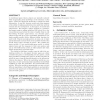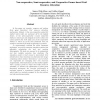376 search results - page 55 / 76 » Evaluating a computational model of social causality and res... |
124
click to vote
SIGECOM
2006
ACM
15 years 7 months ago
2006
ACM
In traditional game theory, players are typically endowed with exogenously given knowledge of the structure of the game—either full omniscient knowledge or partial but fixed in...
109
click to vote
ATAL
2010
Springer
15 years 2 months ago
2010
Springer
Agent-based simulations are an increasingly popular means of exploring and understanding complex social systems. In order to be useful, these simulations must capture a range of a...
106
click to vote
CORR
2007
Springer
15 years 1 months ago
2007
Springer
We conducted a preliminary field study to understand the current state of personal digital archiving in practice. Our aim is to design a service for the long-term storage, preserv...
118
click to vote
PERCOM
2010
ACM
15 years 5 months ago
2010
ACM
—This paper studies economic models of user participation incentive in participatory sensing applications. User participation is the most important element in participatory sensi...
IPPS
2006
IEEE
15 years 7 months ago
2006
IEEE
In this paper we consider, compare and analyze three game theoretical Grid resource allocation mechanisms. Namely, 1) the non-cooperative sealed-bid method where tasks are auction...



